Rachel Berman's Blog
February 2, 2015
7 Pieces of Jane Austen Merchandise You Need to Own
Loving Jane Austen doesn’t end with simply owning her books. No, Jane Austen is a way of life. And thanks to the internet it has become (a little too) easy to fill your walls, kitchen, phones, etc., with all things Austen. Today I’m highlighting a few of my favorites (I may or may not already own half of these items).
1. Emma Litograph Poster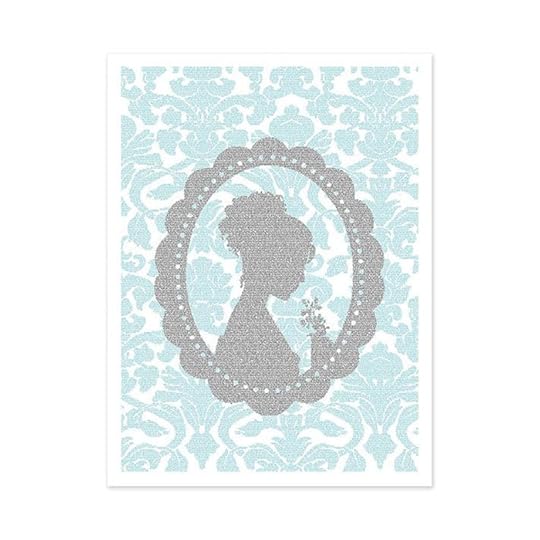
Like pointillism but with words, this poster is made up of text from the novel itself which I think is brilliant. The site features all types of literature and prints these whimsical designs on tote bags and shirts as well.
2. I Heart Mr. Darcy Tote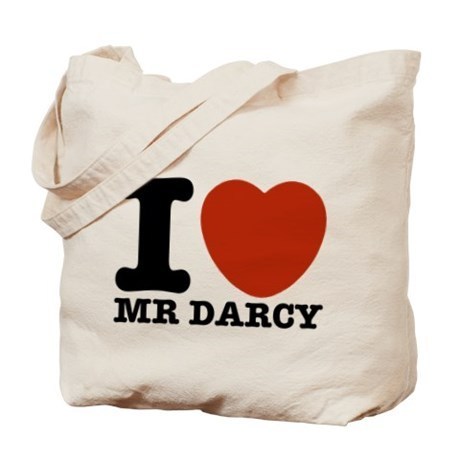
I have a serious obsession with canvas bags and this collection of Jane Austen-inspired ones, isn’t helping. I chose the most iconic for the purposes of this list, but there are so many other great ones to check out too!
3. Aerendgast
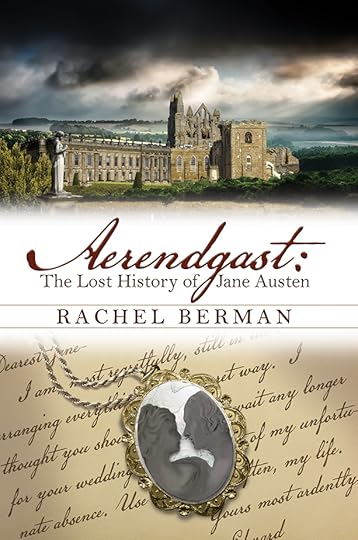
Shameless plug time. If you love Jane Austen, you’ll love my upcoming novel, Aerendgast: The Lost History of Jane Austen. It’s a historical mystery that asks the question: what if Jane Austen was secretly married? And what if someone was prepared to do anything to make sure her secret never comes out? Coming out in February! Check back for more details.
4. Jane Austen Action Figure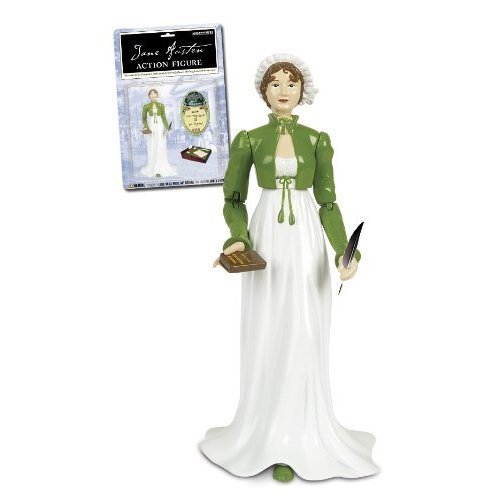
Complete with quill, iconic writing desk, and copy of Pride & Prejudice, this action figure (do not call her a doll), is equal parts hilarious and amazing. I’d like to think Jane would be amused and slightly embarrassed about its existence.
5. Austen Heroines iPhone Case
Even though Marianne is weirdly left off of this list, its minimalist style is really visually appealing. And only a true Austen fan will get the reference, allowing you to feel ever-so-slightly superior. Always a plus.
6. Persuasion Crest T-Shirt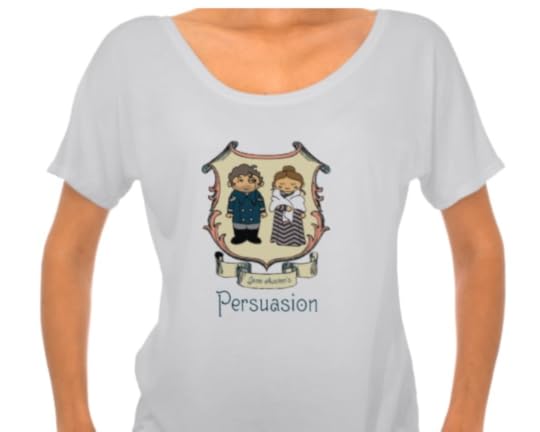
This shirt is adorable. I didn’t know I needed cute illustrations of Wentworth and Anne in wearable form, but now that I have found this, there’s no looking back.
7. Jane Austen Literary Mug
Before you even have to speak, or even if you don’t want to, this mug proclaims that you’re smart, sassy, and have great taste in books.
Fess up! How many of these or like items do you own?
January 26, 2015
The 9 Best Jane Austen Quotes About Love
It’s not even February yet but when I walked the aisles of my local market today, there was already an entire area devoted to all things Valentine’s Day. Instead of yelling “too soon!” and throwing a sea of conversation hearts on the floor, I am embracing the early celebration of v-day with Jane Austen. I know I’m asking for trouble with the title of this post, and I welcome it whole-heartedly. Please disagree with me in the comments.
9. Sense and Sensibility 
#Preach
8. Pride and Prejudice 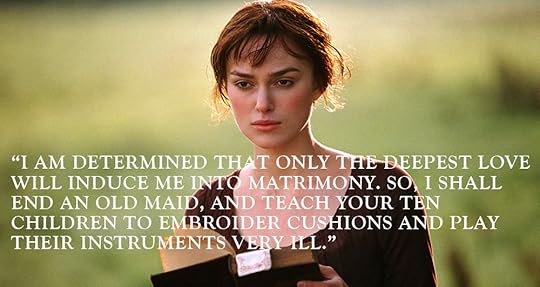
At the time this sort of statement was revolutionary (at least for a woman to say out loud). Marrying was the only way for a woman to secure her future. If, like Austen, you did not marry, you were sure to be poor, obscure, and pitied. Choosing potential spinsterhood over a comfortable, but loveless, marriage makes Elizabeth Bennet a Georgian superhero.
7. Northanger Abbey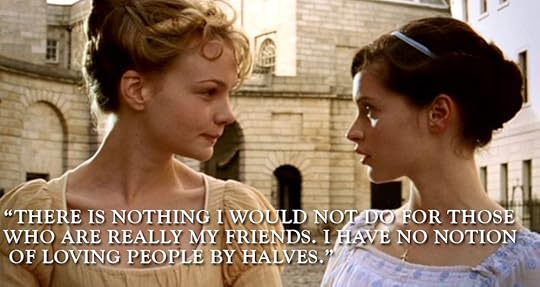
I think we call agree that Isabella Thorpe is a mostly detestable person who uses Catherine to get to her brother James (whom Isabella thinks will inherit a lot of money). I can forgive her for some of this back-handedness, because lord knows being a poor, unmarried lady in the Regency must have been terrifying. Regardless, the above really rings true for me.
6. Mansfield Park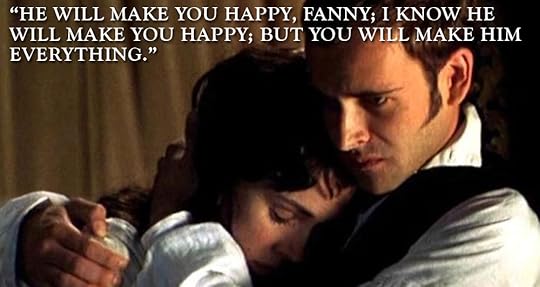
Everytime I read this, I want to shout at the top of my lungs, “DAMMIT EDMUND, GROW A PAIR.” But I have to admit, the sentiment rings true. If someone loves you, they should treat you like you’re the sun and stars. Above all, the feeling should be mutual.
5. Northanger Abbey
I’m partial to Henry Tilney because he’s very 3-dimensional and modern. Teasing Catherine Morland to within an each of her life, making fun of love, all the while falling for her. It is too sweet for words.
4. Pride and Prejudice
Austen perfectly describes the sensation of falling in love: it sweeps you off your feet and creeps slowly up on you simultaneously. This line actually reminds me a lot of that now-famous quote from The Fault in Our Stars, “I fell in love the way you fall asleep: slowly and then all at once.” Perhaps John Green was paraphrasing Jane Austen all the while?
3. Emma
Mr. Knightley says this to Emma when he finally professes his love and I go weak in the knees every time. (Jeremy Northam probably doesn’t hurt the situation either.) There’s something about a guy struggling to articulate his feelings, am I right?
2. Sense and Sensibility 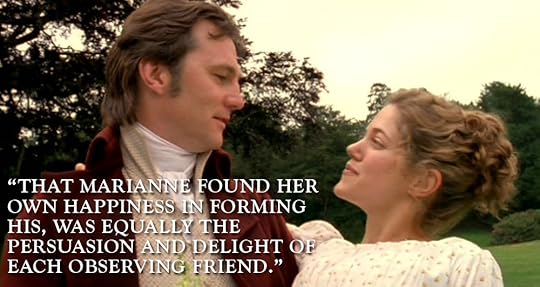
This is pretty much the definition of mutual affection. Sigh.
1. Persuasion 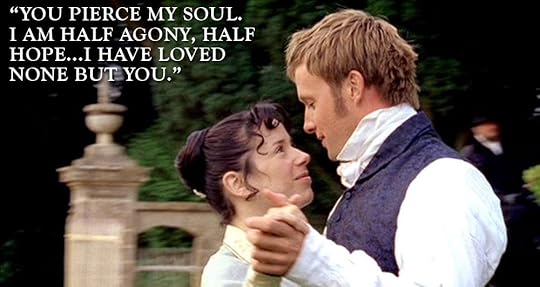
BRB there’s something in my eye…
Alright, now that we’ve counted down Austen’s love quotes, get ready to see her life in a whole new light with Aerendgast: The Lost History of Jane Austen. I think a lot of readers are so intrigued by Austen because of her ability to write beautiful love stories without ever being in love herself. Aerendgast rewrites history and gives Jane Austen a story worthy of one of her novels. Coming out this February, stay tuned for details!
Okay, now let’s debate!
January 19, 2015
Austen’s Men
Let’s talk about Jane Austen and how she wrote men. Why? Because I think they remain one of the favorite subjects of lots of her readers over the centuries. Also they’re dreamy and that’s worth highlighting from time to time. I took a class on Jane Austen, and other female writers of the late eighteenth century, as an undergrad and we spent a week talking about masculinity in their work. When you think about it, it’s the one thing all of Austen’s heroes have in common.
Henry Tilney is mischievous, sarcastic, and a mystery, but I don’t think anyone can deny that he is also strong and manly, taking up as part of his duties the well-being of his sister, butting heads with his father, and dealing (not so well) with jealousy over Catherine Morland.
If you compare and contrast George Knightley and Emma’s father, you see that Mr. Woodhouse is severely lacking masculinity. He’s a hypochondriac, nearly agoraphobic, and depends on her for almost everything. Knightley is the exact opposite. Staunchly independent, yet a friend of (almost) everyone in Highbury, Knightley takes his responsibilities seriously–and expects others to do the same. He chides Emma whenever he feels she’s done wrong, perhaps because her father never has. We are clearly meant to favor one type of behavior over the other.
Darcy and Wentworth are almost too masculine for their own good. Each allowing their pride to get (temporarily) in the way of their happiness, but the reader ultimately admires them for their unwavering character. Had they been more wishy-washy and “modern” sharing their feelings and writing poetry, we would have loved them less.
I’m not going to talk about every Austen guy, but obviously I have to mention Colonel Brandon. The man tames wild hawks for sport. His complete understanding of who he is and his total lack of self-consciousness, are really breathtaking. Unlike Marianne and Eleanor’s father, who has no choice but to leave them penniless and cannot count on his son to help them, Brandon helps the daughter of the woman he loved but couldn’t marry. Talk about manning up.
Anyways, I’ve always thought it interesting that Austen’s heroines are given two examples of men: the good and the bad. Without doubt, the good is always overtly masculine. Even the beloved Mr. Bennett, is not able to support his family due to his years of overspending and negligence. We know Mr. Darcy will never let the same happen to he and Elizabeth. And that makes us love him, and Austen’s other heroes, all the more.
Update on Aerendgast: The publishing date has been moved up to this February! Stay tuned for news and excerpts from the book!
March 29, 2014
Jane Austen’s Secret Love

All we can be reasonably sure of is that at Sidmouth Jane met a young gentleman who showed signs of being extremely attracted by her. We do not know his name nor his profession, though there is a suggestion that he was a clergyman. We do know that he was handsome, intelligent and possessed of unusual charm; so much so that Cassandra, who hardly ever praised anybody, praised him warmly and even thought him good enough for her sister Jane. – A Portrait of Jane Austen, p. 97
When fans think of Austen’s great love, our thoughts immediately turn to Tom Lefroy. But it was a different man that inspired Aerendgast, and the alternate history that I’ve written for Austen. I came across the above passage in David Cecil’s wonderful book five years ago. I had already taken an entire course on Austen at college but had never heard of this mysterious man she encountered at Sidmouth in 1801. Something about the story, perhaps the lack of details, immediately intrigued me. I’ve always wondered how, without a great love herself, Austen was able to chronicle its triumphs and despairs so truthfully in her books. Lefroy was never this love. Jane wrote about him often enough, but with complete indifference. While some have argued that Jane couldn’t have expressed her true feelings knowing that multiple eyes would see her letters, I would argue, using her characters as the proof, that she had passion enough not to worry about such conventions if she had truly loved someone.
Jane and the mysterious young man met at Sidmouth and during their short acquaintance there, fell in love. We don’t know his name, but sources tend to agree that he was a clergyman.
It was understood that he would soon come back and join the family again. Cassandra had no doubt that he would then state his intentions and that Jane would receive them favourably. – Cecil, p. 97
The love story ended quite tragically when the Austen’s received word that Jane’s betrothed-to-be died suddenly. However, this is where the story in Aerendgast truly begins. What if this mysterious man had lived? What if he and Jane were secretly married after all?
Aerendgast: The Lost History of Jane Austen is set to be released in a few short weeks! Check back for updates.
February 19, 2014
Just Released: The Cover of Aerendgast
I’m thrilled to be able to show off the cover of Aerendgast: The Lost History of Jane Austen. I think it’s such a great representation of the book, and am so excited that we’re getting closer and closer to publication (in April).

What if Jane Austen was secretly married? What if she had a baby whose descendants were still alive today? In Aerendgast, that’s what Violet Atherton has to find out, but she isn’t the only one interested in the famous authors’ secrets. Someone is willing to do whatever it takes to stop Violet from uncovering the truth.
So, let me know: What do you think?
January 25, 2014
Adapting Austen
Almost as delightful as pouring over one of Austen’s books is watching it come to life in a television or film adaptation. Finally, the characters exist somewhere other than your head/dreams/imagination! (Hopefully that’s not that just me…)
But, in my opinion, not all adaptations of Austen’s work were created equally. So, I’m going to quickly go over my favorites here and how they had a part in influencing my upcoming novel, Aerendgast: The Lost History of Jane Austen (soon to be published by Meryton Press).
Pride and Prejudice
This is a tough one. And no doubt some of you will disagree with me. I know how you feel, I was once you. I swore up and down that the Colin Firth and Jennifer Ehle P&P was THE ONLY version worth seeing. It’s so incredibly true to the book, and the genius addition of the lake scene is now so infamous that a town in the UK erected this to celebrate the book’s 200th birthday:
However, I have to say that the Matthew Macfadyen and Keira Knightley version from a few years ago is my absolutely favorite hands down. I know lots was cut out for time. I know it’s not 100% true to the book. I know that Keria isn’t everyone’s ideal Lizze and Matthew isn’t everyone’s ideal Darcy. But what the film does incredibly well, better than most, is perfectly capture the tone of the book through cinematography and score. The result is that the feeling I get watching the movie is the same feeling I get reading the book. For example, the first time Darcy proposes to Lizzie, in the film, it’s raining. As the scene escalates, the rain pours down harder and harder, evoking the feelings of Darcy and Lizzie in that moment without the aid of a narrator.
Sense & Sensibility
Another controversial choice, I know. Believe me, I love Alan Rickman. I love Emma Thompson. But, my favorite S&S is the BBC’s recent version with Charity Wakefield, Hattie Morahan, and Dan Stephens (pre-Downton Abbey!). First of all, I love this cast. David Morrisey, Janet McTeer, Dominic Cooper; everyone is perfection. But again, this adaptation captures, in a way previous versions have not, the isolation of the Dashwood’s, the limited choices the girls have once their father dies and their step brother refuses to help them, and the way that love evolves as we grow up. These themes are reflected in the beautifully desolate locations and the time and care given to the pace of the story.
Emma
Two words: Jeremy Northam. There is no other Mr. Knightley. He is so swoon-worthy in this role that I will still watch literally anything he is in, because he was once Mr. Knightley. There was one summer in high school that I must’ve watched this version of Emma (starring Gwyneth Paltrow) once a day. It’s not perfect, Emma is a much nicer person that she is in the book, large pieces of the plot are missing, but it manages to capture the seriousness and silliness of the book while adding a bit of whimsy that’s completely new.
Northanger Abbey
One of my favorite novels by Austen (I find Henry Tilney just delightful), Northanger hasn’t been adapted often. Felicity Jones and JJ Field do an absolutely wonderful job in Masterpiece’s recent adaption of Austen’s first novel. The Gothic satire shines through and there’s another top-notch rain scene that is 100% dreamy. Trust me.
As this post is becoming a novel itself I’ll save Mansfield Park and Persuasion for another day.
Being able to watch Austen adaptions helps me visualize the time, place, and circumstances of Austen’s life in a way that books can’t always provide. Seeing her characters come to life helps me pick and choose how to incorporate them into my book. In Aerendgast, Jane Austen’s life becomes much more tragic than any of her characters’, but it’s through a combination of reading her words and watching them on the screen that I was able to rewrite her story. Aerendgast: The Lost History of Jane Austen, will be published by Meryton Press in April.
Disagree with my list? Let’s talk about it in the comments!
January 17, 2014
Jane Austen’s Lasting Legacy
Jane Austen, and her writing, have become so mainstream that she has an action figure–complete with writing desk and quill pen. So I’m asking a question that hundreds have no doubt asked before me: Why?
I wrote my Master’s dissertation on another famous author, Dickens, and how his writing on London continues to shape peoples’ perceptions of that city. The short answer is that his writing is nuanced and compelling; the longer one is that he was writing at a specific time and place, the beginning of the modern era; when, for the first time, charities were being formed to helped the poor that he was writing about; books were being shipped to America and all across the world; he was writing about the city at the center of the Universe at a time when its influence and reach was peaking; etc.
But Austen’s lasting popularity is of an entirely different sort. She isn’t known for sweeping descriptions of famous places, or tackling social issues that plagued the country. She wrote about people. And she wrote about them honestly.
Austen’s stories remain incredibly relevant while transporting the reader back to an age that, frankly, sometimes seems like a dream when juxtaposed with the more mundane realities of our day to day lives–even though, as we know, it was not. Somewhat ironically, her characters feel that same dullness and want of something more that we do. Emma Woodhouse thinks she needs to be the world’s greatest matchmaker so that she has a purpose. Kitty and Lydia Bennett long for dances, travel, and a chance to see the regiment, as ways of varying their unrewarding daily routine. Catherine Morland imagines she is the heroine in a Gothic horror because she has not had an opportunity to go out and live her own adventures. This is what endears them to us. We have an instant connection with them, we understand them, we see ourselves in them. As a result, they mean more to us than other characters we come across in novels.
One of the ideas I thought about when writing my book was the fact that Austen herself couldn’t have lived a very happy life. Never married (even after one or two suitors), lived with her parents until she died in the early forties, novels that were only moderate successes in her lifetime. So how did she create some of the most joyous love stories ever put to pen? In Aerendgast, I’ve rewritten her story with twists and turns, joys and sadness. But more than anything else I’ve tried to give her a voice beyond just that of just the spinster, the author, the chick lit icon. I’ve attempted to make her a three dimensional person with the fears, hopes, worries, and dreams like the rest of us.
Aerendngast will be published April 1, 2014.
October 8, 2013
Aerendgast
My first novel, Aerendgast, will be published by Meryton Press in April 2014. Stay tuned for details and talk about all things Jane Austen, the UK, and 19th century literature.
Rachel Berman's Blog
- Rachel Berman's profile
- 4 followers




